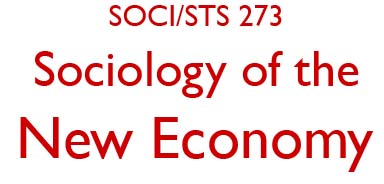
Schedule
September 2
Introduction.
WHAT'S SO NEW ABOUT THE NEW ECONOMY?
September 4
"Cost-Cutting in New York, but a Boom in India." In New York Times, August 11, 2008.
Sweet & Meiskins, Changing Contours of Work, chap. 2.
September 9
Daniel Bell, "From Industrial to Post-Industrial Society: Theories of Social Development." In The Coming of Post-Industrial Society (Basic Books, 1976), 47-119.
Changes in US industrial employment, 1890-2002.
Engine vs. motherboard.
Average annual growth rates of U.S. science & engineering occupations: 1960-2000.
September 11
Florida, The Rise of the Creative Class, chap. 1.
September 16
Florida, The Rise of the Creative Class, chaps. 2-4.
September 18
First take-home exam due.
INEQUALITY AND RISK
September 23
Sweet & Meiskins, Changing Contours of Work, chaps. 4-5.
Florida, The Rise of the Creative Class, chap. 13.
Dalton Conley, "Rich Man's Burden." In New York Times, September 2, 2008.
Bureau of Labor Statistics: Occupational Employment Statistics.
September 25
Diditi Mitra, "Driving Taxis in New York City: Who Wants to Do it?" In S. Javaraman and I. Ness (eds.), The New Urban Immigran Workforce (M.E. Sharpe, 2005), 33-56.
Martin Carnoy, "New Technology and Job Markets." In Sustaining the New Economy (Harvard University Press, 2000), 14-55.
September 30
Thomas L. Friedman, "'What, Me Worry?'" In New York Times, April 29, 2005.
Daniel Bills, "Schooling and Socioeconomic Success" and "Education and Work in the Postindustrial Society." In The Sociology of Education and Work (Blackwell, 2004), 14-36 and 83-111.
Henry M. Levin, "Pedagogical Challenges for Educational Futures in Industrializing Countries." Comparative Education Review 45 (2001): 537-560.
"Men Not Working, and Not Wanting Just Any Job" (New York Times, July 31, 2006).
THE NEW SOCIAL CONTRACT
October 2
Florida, The Rise of the Creative Class, chaps. 5-9.
October 7
Steven Greenhouse, "The Rise and Fall of the Social Contract." In The Big Squeeze: Tough Times for the American Worker (Knopf, 2008), 71-97.
Daniel H. Pink, "How Many Are There?" and "How Did it Happen?" In Free Agent Nation: The Future of Working for Yourself (Warner Business Books, 2002), 27-55.